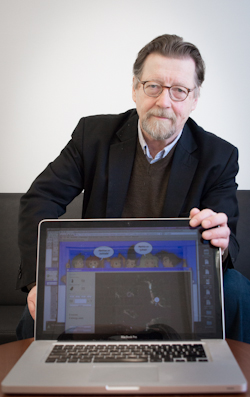Developing the Mathematical Intelligence of Children with Computer Games
Mathematic skills are not a gift that is either given to you at birth or not. According to research, children learn the conceptualisation of mathematics gradually by observing their environment. Games that develop the mathematical reasoning of children are developed in the University of Turku.
 Studies have revealed an interesting connection; how children observe their environment when they are little is connected to how they manage in maths when they are older. For example, if six-year-old preschoolers spontaneously notice the amounts of things, they are likely to do well in school mathematics.
Studies have revealed an interesting connection; how children observe their environment when they are little is connected to how they manage in maths when they are older. For example, if six-year-old preschoolers spontaneously notice the amounts of things, they are likely to do well in school mathematics.
If a child doesn´t take notice to the amounts independently, his or her observations can be guided.
- We are developing a computer game, which helps to get children interested in observing the environment in a way that develops the mathematical skills, Academy Professor Erno Lehtinen tells.
The game has already been tested with kindergarten children. The researchers studied how the game can be used to train the focusing of the attention. Lehtinen tells that the results are promising and the idea is fascinating. Next the game idea is tested with school children.
Conseptualisation of Relations Develops Older Children
Taking notice of amounts doesn´t develop mathematical abilities when the children get slightly older. The operation has become ordinary. Then, it is useful to notice the relations of things like how large part of the plate is filled with salad.
- The children who are good at observing the relations of things are superior in understanding the concept of fractions, Lehtinen tells and continues:
- We are developing two different computer games, which can help with this. One programme could guide children to take pictures of buildings on the town and compare the rations of the different parts of the buildings. The other game that we are developing, aims to teach the children to see how the numbers can be related to each other in different ways. This supports the learning of flexible calculation strategies.
Although, Lehtinen is involved in many teaching technology projects, he warns about seeing the teaching from the technology first point of view.
- You can´t get good learning results by wondering how different technologies can be used in teaching. First, you will have to perceive the development areas of the current teaching. After that you can ponder if teaching technology can be developed for those needs, Lehtinen emphasises.
Multiple Teaching Technology Projects
Different technological applications that advance learning and are pedagogically justifiable are objects of increasing interest.
In the University of Turku, teaching technologies and virtual learning environments are studied and developed especially in the Faculty of Education and its Centre of Learning Research. Also, other faculties and independent units have research projects that are related to teaching technologies.
Below you can find some examples of different research and cooperation projects:
EAGER and ENGAGEMENT in STEM
Faculty of Education and Centre of Learning Research
• The effects and possibilities of teaching technologies
• Electronic learning materials
• Projects are part of the research programme of the Academy of Finland.
COSILAB
Centre of Learning Research
• Combining computer simulation and laboratory work together in the teaching of natural science in primary schools
MedEd/LearnMedImage
Centre of Learning Research
• Viewing strategies of new types of picture data like virtual microscopy
• Collaboration with education researchers and teachers of clinical medicine
ViLLE Visual Learning Tool
Faculty of Mathematics and Natural Sciences, Department of Information Technology
• Training system of the teaching of programming and mathematics, which improves results and studying motivation
• Programme is in use in 20 different countries.
Virtual Teams in International Business (VIBu)
Turku School of Economics, Department of Management
• Learning environment/simulation, where students train running a virtual corporation in global markets
• Programme is used in universities all around the world.
Smart Classroom
Business and Innovation Development (BID) Center
• Smart Classroom concept/operations model, which aims to gather and put into operation the best practices of teaching technologies in the University of Turku
• New teaching materials and applications, for example for the training of innovation and business know-how
Digital Learning Environments and Personalised Learning
Research Unit for the Sociology of Education (RUSE), RoSA Laboratory
• Pedagogical solutions for digital learning environments
• Focus on the uniqueness and individuality of the learners
Get a life 2.0
Finland Futures Research Centre
• Game like web tool for the career planning of the university students
• Pedagogical models to support the career counseling
AVATAR 2020 – on the way to the school of the future
Brahea Centre for Training and Development, Finland Futures Research Centre, RUSE
• National, multidisciplinary personnel training project of education
• Promoting the use of information and communication technology and invocation of electronic, virtual and innovative learning environments in teaching
Text: Hannu Aaltonen and Liisa Reunanen
Translation: Henna Borisoff
Photographs: Hannu Aaltonen and cogdogblog